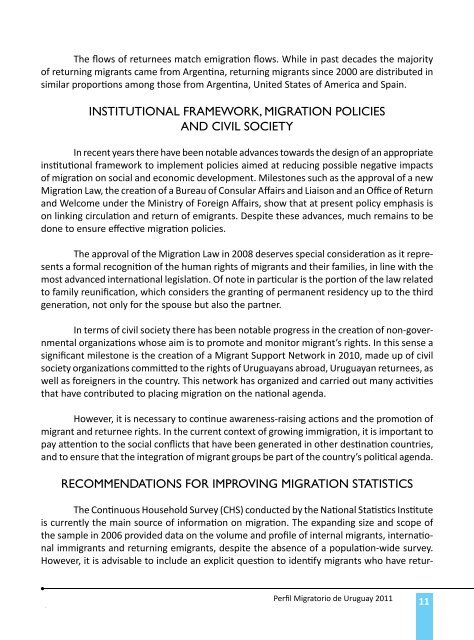Perfil Migratorio de Uruguay - IOM Publications
Perfil Migratorio de Uruguay - IOM Publications
Perfil Migratorio de Uruguay - IOM Publications
Create successful ePaper yourself
Turn your PDF publications into a flip-book with our unique Google optimized e-Paper software.
The flows of returnees match emigration flows. While in past <strong>de</strong>ca<strong>de</strong>s the majority<br />
of returning migrants came from Argentina, returning migrants since 2000 are distributed in<br />
similar proportions among those from Argentina, United States of America and Spain.<br />
INSTITUTIONAL FRAMEWORK, MIGRATION POLICIES<br />
AND CIVIL SOCIETY<br />
In recent years there have been notable advances towards the <strong>de</strong>sign of an appropriate<br />
institutional framework to implement policies aimed at reducing possible negative impacts<br />
of migration on social and economic <strong>de</strong>velopment. Milestones such as the approval of a new<br />
Migration Law, the creation of a Bureau of Consular Affairs and Liaison and an Office of Return<br />
and Welcome un<strong>de</strong>r the Ministry of Foreign Affairs, show that at present policy emphasis is<br />
on linking circulation and return of emigrants. Despite these advances, much remains to be<br />
done to ensure effective migration policies.<br />
The approval of the Migration Law in 2008 <strong>de</strong>serves special consi<strong>de</strong>ration as it represents<br />
a formal recognition of the human rights of migrants and their families, in line with the<br />
most advanced international legislation. Of note in particular is the portion of the law related<br />
to family reunification, which consi<strong>de</strong>rs the granting of permanent resi<strong>de</strong>ncy up to the third<br />
generation, not only for the spouse but also the partner.<br />
In terms of civil society there has been notable progress in the creation of non-governmental<br />
organizations whose aim is to promote and monitor migrant’s rights. In this sense a<br />
significant milestone is the creation of a Migrant Support Network in 2010, ma<strong>de</strong> up of civil<br />
society organizations committed to the rights of <strong>Uruguay</strong>ans abroad, <strong>Uruguay</strong>an returnees, as<br />
well as foreigners in the country. This network has organized and carried out many activities<br />
that have contributed to placing migration on the national agenda.<br />
However, it is necessary to continue awareness-raising actions and the promotion of<br />
migrant and returnee rights. In the current context of growing immigration, it is important to<br />
pay attention to the social conflicts that have been generated in other <strong>de</strong>stination countries,<br />
and to ensure that the integration of migrant groups be part of the country’s political agenda.<br />
RECOMMENDATIONS FOR IMPROVING MIGRATION STATISTICS<br />
The Continuous Household Survey (CHS) conducted by the National Statistics Institute<br />
is currently the main source of information on migration. The expanding size and scope of<br />
the sample in 2006 provi<strong>de</strong>d data on the volume and profile of internal migrants, international<br />
immigrants and returning emigrants, <strong>de</strong>spite the absence of a population-wi<strong>de</strong> survey.<br />
However, it is advisable to inclu<strong>de</strong> an explicit question to i<strong>de</strong>ntify migrants who have retur-<br />
<strong>Perfil</strong> <strong>Migratorio</strong> <strong>de</strong> <strong>Uruguay</strong> 2011<br />
11

















